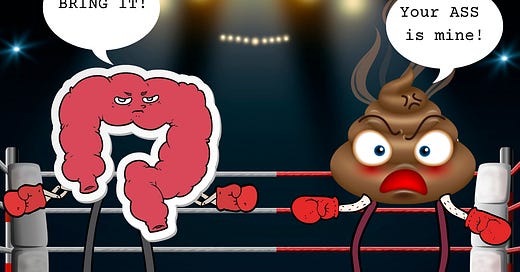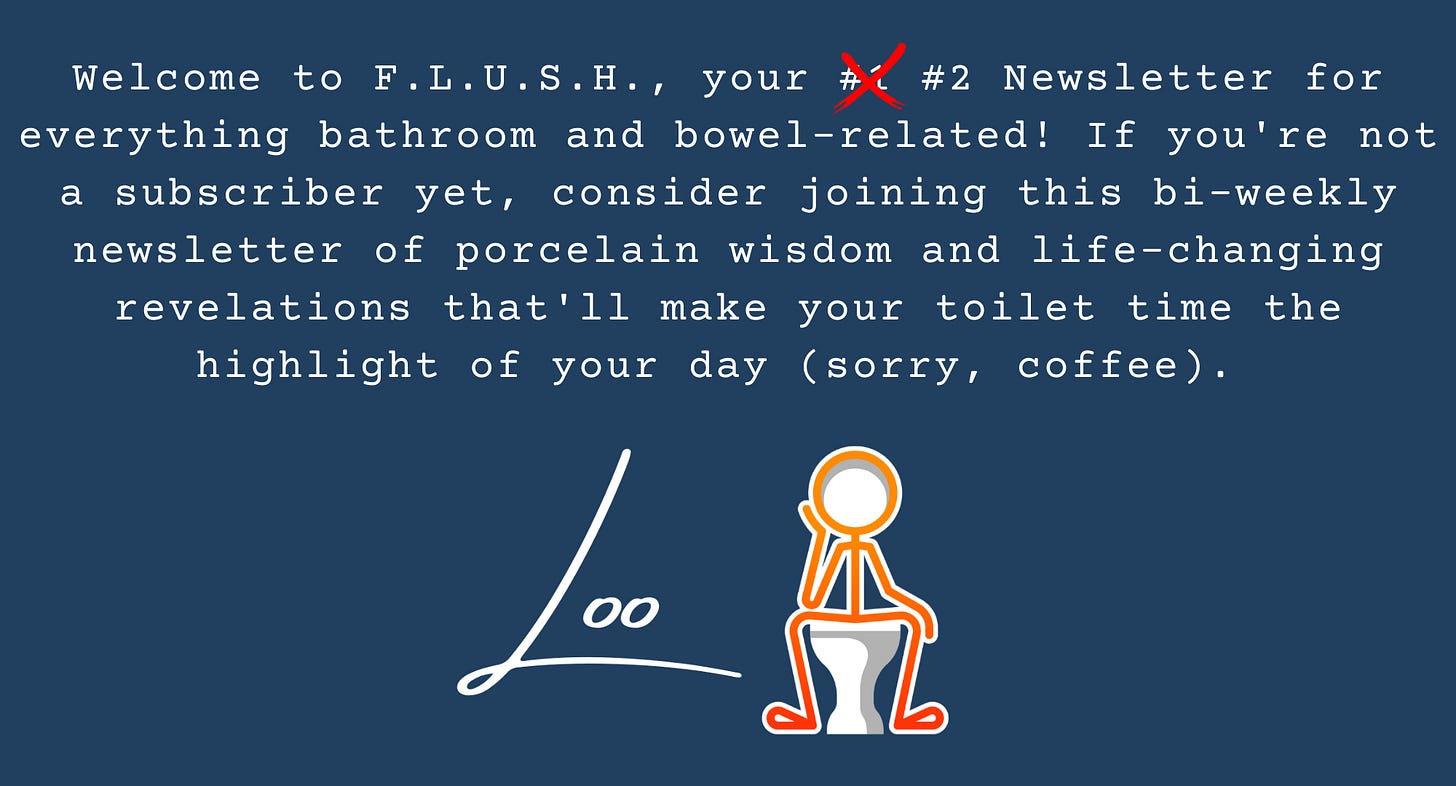When it comes to the fundamentals of our innards, it’s more than a sticky situation.
This is the world of fecal impaction, where your colon's walls literally become the battleground for an epic showdown. It’s your Colon vs. the Stool Squatters. Let’s dive deep into this more-than-unpleasant match-up, and uncover how it all goes down.
So imagine your colon as a bustling freeway for your body's waste – a freeway that can turn into a bumper-to-bumper nightmare due to fecal impaction. Fecal MATTER is all fine and good, but impaction occurs when it becomes a massive mound of rock-hard stool. It’s much like a “squatter” that sets up shop in your colon. It’s intrusive and refuses to budge. And to make matters worse, more of them come and stay.
And guess who gets choked out? Your colon's walls and muscles. They get caught in a tangled mess, desperately trying to move things along but not able to do so effectively, if at all.
You see, your colon relies on a wave-like motion of muscle contractions called peristalsis to nudge your precious fecal cargo toward the exit (yes that would be the rectum). If the peristalsis is stymied, the Stool Squatters stay put. It’s almost like the walls of your colon get smothered with squatters who are there for an indefinite staycation. And trust me, that's not a staycation you wanna host.
So what causes the Stool Squatters to intrude and jam everything up? Let’s look at the usual suspects behind this unfortunate scenario.
Chronic Constipation: The Stool Stopper
Have you ever experienced the frustrating case of "Where's Waldo?" with your bowel movements?
If your visits to the commode are becoming rare, it's time to consider if you have chronic constipation. When your bowel movements hit snooze, waste material overstays its welcome in your colon, creating the perfect conditions for impaction.
As time ticks by, water in your stool steps out on vacation somewhere else in your body, transforming your once-friendly stool into a rock-hard boulder. The result? A growing mass of Stool Squatters that think they are your colon’s VIP. They take up precious room, pressing against the walls, and cause you to feel like something's just not right.
Crappy Diet + Not Enough Hydration = Dis-ASS-ter
Remember that saying, "You are what you eat"? Well, it's not just a cliché – it's the truth, especially when it comes to your bowels.
If your diet is a rollercoaster of fast food and lacks the fiber your gut desires, you're setting the stage for an unwelcome appearance by none other than Mr. Stool Squatter himself.
Fiber, found in vibrant veggies and juicy berries, is extremely helpful in the world of digestion. Fiber adds bulk to your stool and keeps things moving smoothly. But if you're sending in the fast-and-convenient food gang, you're overwhelming your intestines, leaving your colon to deal with the unpleasant aftermath.
And let’s not forget hydration. Water is your colon's best friend.
Water is the ultimate colon lubricant, keeping your stool soft and ready for movement. If you neglect to stay hydrated, you might find yourself in a bathroom battle, straining away with nothing to show for it.
Keep It Moving: No Couch Potatoes
Nobody wants a lethargic colon - It's like having a sloth for a co-pilot on the road of digestion.
If your exercise routine is more couch-potato than power-walker, maybe consider perking up your daily routine. Regular physical activity is like a gentle nudge to your bowels, encouraging them to do their duty with a bit more enthusiasm.
There’s no need to become an Olympic athlete – a mere daily stroll of just 30 minutes can be the game-changer your gut has been waiting for.
A little exercise can go a long way.
Medical Woes and Antibiotics: Unexpected Culprits
Unforeseen medical challenges can be a pain in the ass. But our bodies must adapt.
Take, for instance, conditions like Parkinson's disease or irritable bowel syndrome (IBS). Conditions like these can disrupt the smooth flow of your colon's movements. Unfortunately, this disruption can pave the way for the unwelcome arrival of Stool Squatters, wreaking havoc in your colon and causing discomfort.
And let’s not forget antibiotics.
While they are effective in various scenarios, their influence within your gut can be a bit of a mixed bag. Antibiotics can inadvertently upset the delicate balance of your gut microbiome which plays a crucial role in digestion. The last thing you want is for your delicate ecosystem to be thrown off-kilter.
This is where the use of Probiotics can be very helpful.
When faced with a medical condition or using antibiotics can’t be helped, taking probiotics can reintroduce the good bacteria into your gut. This can help re-establish the natural order of things and keep your bowels in their rhythmic motion. It’s important to get your bowel movements back on track so stool does not stay compacted on the walls of your colon. Probiotics can be achieved via a supplement as well as by eating certain foods like sauerkraut, kimchi, kefir, yogurt, and others.
Please be sure to consult with your physician to decide if probiotic supplements are right for your unique situation.
Give Stool Squatters The BOOT
The best way to keep these Stool Squatters out of your colon is to adhere to a consistent, daily health regimen by which you can successfully protect your colon’s sanctity.
First off as mentioned, hydration 💧 is key (sorry, your coffee ☕️ habit won't cut it). So ensure water intake is appropriate for your weight and body type. Additionally, chow down on fiber-rich, nutrient-packed foods, and don't let your ass become a couch's permanent resident. And when needed, add in some gut-loving probiotics.
So say “BYE” to the unpleasant clutches of fecal impaction. Give the unwanted Stool Squatters the boot and grant your colon the respect it deserves.
Your colon will return the favor with BLISSFUL RELEASES that will keep your colon’s freeway moving smoothly.












